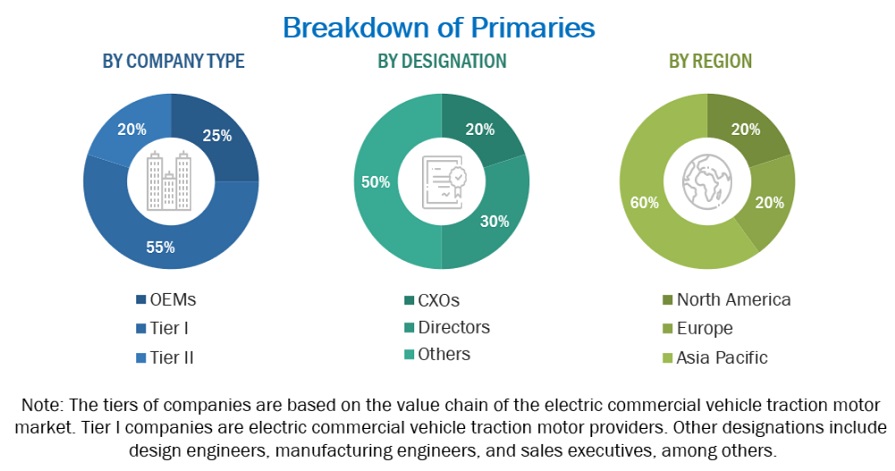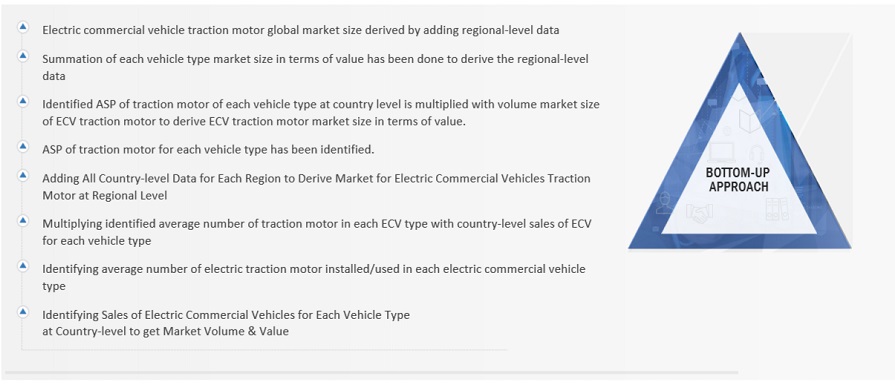This research study involved the extensive use of secondary sources, such as company annual reports/presentations, industry association publications, automotive magazine articles, directories, technical handbooks, the World Economic Outlook, trade websites, technical articles, and databases, to identify and collect information on the Electric Commercial Vehicle Traction Motor market. In-depth interviews were conducted with various primary respondents, including key industry participants, subject-matter experts (SMEs), C-level executives of key market players (ECV traction motor manufacturers and suppliers), and industry consultants, among other experts, to obtain and verify critical qualitative and quantitative information and assess market prospects.
Secondary Research
In the secondary research process, various secondary sources have been used to identify and collect information on the electric commercial vehicle traction motor market for this study. Secondary sources include annual reports, press releases, and investor presentations of companies; whitepapers, certified publications, and articles from recognized authors; directories; databases; and articles from recognized associations and government publishing sources.
Primary Research
Extensive primary research has been conducted after understanding the electric commercial vehicle traction motor market scenario through secondary research. Several primary interviews have been conducted with market experts from both the demand (OEMs) and supply (electric commercial vehicle traction motor manufacturers and component manufacturers) sides across major regions, namely, North America, Europe, and Asia Pacific. Approximately 30% and 70% of primary interviews have been conducted from the demand and supply sides, respectively. Primary data has been collected through questionnaires, emails, and telephonic interviews.
In the canvassing of primaries, various departments within organizations, such as sales, operations, and marketing, have been covered to provide a holistic viewpoint in the report. After interacting with industry experts, brief sessions have been conducted with highly experienced independent consultants to reinforce the findings from primaries. This, along with the opinions of in-house subject matter experts, have led to the findings, as described in the remainder of this report.

To know about the assumptions considered for the study, download the pdf brochure
Market Size Estimation
A detailed market estimation approach has been followed to estimate and validate the value and volume of the electric commercial vehicle traction motor market and other dependent submarkets, as mentioned below:
-
The market size has been derived by collecting sales of electric commercial vehicles (Pickup trucks, medium-duty and heavy-duty trucks, light and full-size vans, and buses & coaches ) through association and paid databases.
-
The average number of traction motors per electric commercial vehicle type has been considered to gain the market size by value and volume in the market
-
Key players in the market have been identified through secondary research, and their global market share has been determined through primary and secondary research.
-
The research methodology includes the study of annual and quarterly financial reports, regulatory filings of major market players, and interviews with industry experts to gain detailed market insights.
-
All major penetration rates, percentage shares, splits, and breakdowns for the electric commercial vehicles traction motor market have been determined through secondary sources and verified through primary sources.
-
All key macro indicators affecting the revenue growth of the market segments and subsegments have been accounted for, viewed in extensive detail, verified through primary research, and analyzed to get the validated and verified quantitative & qualitative data.
The gathered market data has been consolidated and added with detailed inputs, analyzed, and presented in this report.

To know about the assumptions considered for the study, Request for Free Sample Report

Data Triangulation
All percentage shares, splits, and breakdowns have been determined using secondary sources and verified by primary sources. All parameters that affect the markets covered in this research study have been accounted for, viewed in extensive detail, and analyzed to obtain the final quantitative and qualitative data. This data has been consolidated, enhanced with detailed inputs and analysis from MarketsandMarkets, and presented in the report. The following figure is an illustrative representation of the overall market size estimation process employed for this study.
Market Definition
A traction motor is a type of electric motor that is specifically designed for providing propulsion in vehicles such as electric vehicles (EVs). It delivers torque to drive the wheels or axles of the vehicle, providing the necessary traction to power the vehicle's movement. A traction motor is typically designed to operate at high efficiency and with high power density, making it an important component in the powertrain of modern vehicles. ECV traction motor are specifically designed for commercial vehicles such as buses, trucks, vans, and pickup trucks.
List of Key Stakeholders
-
Associations, Forums, and Alliances related to Electric Trucks
-
Automobile Manufacturers
-
Automotive Component Manufacturers
-
Automotive Investors
-
Battery Distributors
-
Battery Manufacturers
-
Companies Operating in Autonomous Vehicle Ecosystem
-
Distributors and Retailers
-
Electric Bus Manufacturers
-
Electric Commercial Vehicle Traction Motor Manufacturers, Dealers and Suppliers
-
Electric Pickup Truck Manufacturers
-
Electric Traction Motor Manufacturers
-
Electric Van Manufacturers
-
End Users
-
Environmental and Industrial Associations
-
EV Component Manufacturers
-
EV Infrastructure Component Manufacturers
-
EV Infrastructure Developers
-
EV Manufacturers, Distributors, and Retailers
-
Electric Medium and Heavy-duty Truck Manufacturers
-
EV Component Manufacturers
-
EV Distributors and Retailers
-
Government Agencies and Policy Makers
-
Manufacturers of Electric Vehicles (EVs)
-
Motor Manufacturing Companies
-
Original Equipment Manufacturers
-
Raw Material Suppliers for traction motor or Components
-
State and National Regulatory Authorities
-
Traders and Distributors of Electric Vehicles
-
Transport Authorities
Report Objectives
-
To segment and forecast the size of the electric commercial vehicle traction motor market in terms of volume (units) and value (USD million) from 2019 to 2030
-
To define, describe, and forecast the market based on vehicle type, motor type, power output, design, transmission, axle architecture and region
-
To segment and forecast the market size by volume and value at the regional level based on vehicle type (pickup trucks, trucks (medium-duty trucks and heavy-duty trucks), vans (light vans and full-size vans), and buses & coaches
-
To segment and forecast the market size by volume based on motor type (permanent magnet synchronous motor, AC induction motor, and DC traction motor)
-
To segment and forecast the market size by volume based on power output (less than 100 kW, 100 – 200 kW, 200 – 400 kW and above 400 kW)
-
To segment and forecast the market size by volume based on design (radial flux and axial flux)
-
To segment and forecast the market size by volume based on transmission (single speed drive and multi-speed drive)
-
To segment and forecast the market size by volume based on axle architecture (integrated axle and central drive unit)
-
To forecast the market size with respect to key regions, namely, Asia Pacific, Europe, and North America
-
To provide detailed information regarding the major factors influencing the market growth (drivers, challenges, restraints, and opportunities)
-
To strategically analyze markets with respect to individual growth trends, prospects, and contributions to the total market
-
To strategically profile key players and comprehensively analyze their market share and core competencies
-
To analyze opportunities for stakeholders and the competitive landscape for market leaders
-
To track and analyze competitive developments such as product launches, deals, and others undertaken by the key industry participants
-
To study the following with respect to the market:
-
Supply Chain Analysis
-
Ecosystem Analysis
-
Technology Analysis
-
HS Code
-
Case Study Analysis
-
Patent Analysis
-
Regulatory Landscape
-
Conferences and Events
-
Average Selling Price Analysis
-
Buying Criteria
-
To analyze opportunities for stakeholders and the competitive landscape for market leaders
-
To track and analyze competitive developments such as product developments, deals, and others undertaken by the key industry participants
Available Customizations
With the given market data, MarketsandMarkets offers customizations in accordance with the company’s specific needs.
-
Electric commercial vehicle traction motor market, by motor type, at country level (for countries covered in the scope of the report)
-
Profiling of additional market players (up to 5)



Growth opportunities and latent adjacency in Electric Commercial Vehicle Traction Motor Market